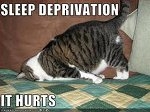CPAP for PLMS?
-
Guest
CPAP for PLMS?
I had my first sleep study in October. It showed moderate apnea (on my back only). The big problem was the PLMS. The sleep doc is suggesting treating this with CPAP. He suggests the twitching is caused by lack of oxygen.
My gut instinct tells me not to buy this. None of the research I have done suggests that you can treat PLMS with a CPAP machine. I did a follow up study with the machine and am waiting to see the results before I sign on for expensive equipment.
Can CPAP cure PLMS? Or perhaps my doc would just like me to believe that to sell me an expensive machine????
My gut instinct tells me not to buy this. None of the research I have done suggests that you can treat PLMS with a CPAP machine. I did a follow up study with the machine and am waiting to see the results before I sign on for expensive equipment.
Can CPAP cure PLMS? Or perhaps my doc would just like me to believe that to sell me an expensive machine????
Re: CPAP for PLMS?
Sorry about the question with no introduction, folks.
I'm Amy. 36 years old. Waterloo, Ontario, Canada.
I have been exhausted since I was about 15 and barely able to function for the past 6 months to 1 year!
I'm really looking forward to a solution to this thing.
I'm Amy. 36 years old. Waterloo, Ontario, Canada.
I have been exhausted since I was about 15 and barely able to function for the past 6 months to 1 year!
I'm really looking forward to a solution to this thing.
-
noisemaiden
- Posts: 5
- Joined: Sun May 16, 2010 2:52 pm
- Location: Upper Michigan
Re: CPAP for PLMS?
I was told back in 2002 that I had sleep apnea and put on CPAP. Then in 2005 it was PLM and I was prescribed Mirapex. This helped and I went off my machine. But now I have had another sleep study in 2010 and am on CPAP again. But I still take 0.25 Mirapex (1/2 at supper and 1/2 at bed). This has helped my PLM. They said the CPAP would take care of it, but so far it hasn't. Still have a lot of problems getting used to CPAP.
Re: CPAP for PLMS?
How do you sleep? On your back? On your side? Constantly moving?
If you sleep on your back, or are constantly moving and sometimes on your back, I would certainly want to treat the moderate sleep apnea, regardless of if it helped with your leg movements. Sleep apnea has many negative effects, and many are additive (meaning, the longer you go untreated, the worse they can get). If you've been tired for 15+ years, and sleep apnea may be even just a part of it, I would definitely want to get treatment for that.
I would think it would be possible for the leg movements to improve if your quality of sleep improves, but I certainly have no experience with that, so I'm not one to ask. I was surprised that I DID have leg movements during my sleep study, but my sleep doctor said we had to get the apnea treated first, and then we could look into if I was still having issues with leg movements. (I don't think I do--like I said, I was surprised to see it on my sleep study results.)
I'm sure there are other people on the forum who are more familiar with PLMS/PLMD who will be of more help to you.
jbn
If you sleep on your back, or are constantly moving and sometimes on your back, I would certainly want to treat the moderate sleep apnea, regardless of if it helped with your leg movements. Sleep apnea has many negative effects, and many are additive (meaning, the longer you go untreated, the worse they can get). If you've been tired for 15+ years, and sleep apnea may be even just a part of it, I would definitely want to get treatment for that.
I would think it would be possible for the leg movements to improve if your quality of sleep improves, but I certainly have no experience with that, so I'm not one to ask. I was surprised that I DID have leg movements during my sleep study, but my sleep doctor said we had to get the apnea treated first, and then we could look into if I was still having issues with leg movements. (I don't think I do--like I said, I was surprised to see it on my sleep study results.)
I'm sure there are other people on the forum who are more familiar with PLMS/PLMD who will be of more help to you.
jbn
_________________
| Mask: Swift™ FX For Her Nasal Pillow CPAP Mask with Headgear |
| Additional Comments: titration 11 |
Sleep study (Aug 2010): AHI 16 (On mask AHI 0.2) <-- Now, if I could just attain that "0.2" again!
aPAP for 4 months, Switched to BiPap, 2nd sleep study Feb 2011 Possible PLMD
to quote Madalot..."I'm an enigma"
aPAP for 4 months, Switched to BiPap, 2nd sleep study Feb 2011 Possible PLMD
to quote Madalot..."I'm an enigma"
- SleepingUgly
- Posts: 4690
- Joined: Sat Nov 28, 2009 9:32 pm
Re: CPAP for PLMS?
Perhaps what your doctor meant is that your leg movements are associated with respiratory effort, and therefore are not true PLMS. If I had your findings, I would definitely follow the doctor's advice and try CPAP first, as I would not want to be on dopamine agonists without making sure that I absolutely had to be. He may be right that the respiratory-related movements will disappear on CPAP, or it may turn it out otherwise, but I think you first have to deal with the apnea and then you'll see what's left.
_________________
| Mask: Swift™ FX For Her Nasal Pillow CPAP Mask with Headgear |
| Humidifier: S9™ Series H5i™ Heated Humidifier with Climate Control |
| Additional Comments: Rescan 3.10 |
Never put your fate entirely in the hands of someone who cares less about it than you do. --Sleeping Ugly
Re: CPAP for PLMS?
One would need to understand the nature of their limb movements recorded in a sleep study (ask the doctor if unclear). With OSA the body may do all sorts of things in an effort to resolve a hypopnea or apnea. Limb movements may be a part of that picture. Ideally the details of the study would differentiate between those limb movements that are respiratory related, random, or actually Periodic Limb Movements of Sleep.
I have Periodic Limb Movement Disorder. One case does not a study make, but although CPAP did a lot for me, helping the limb movements was not a part of it. In fact, my PLMD worsened. If one actually has the distinct entity characterized by rhythmic stereotypical limb movments, it's a different ball game. I personally lost a lot of years of possible treatment by not being under the care of someone who knew the potential interactions when one has both OSA and PLMD. It's a cat and mouse game, with the liklihood of missed diagnoses due to erratic results even between multiple sleep studies.
Here's my opinion... Anyone diagnosed with OSA who has a subsequent study showing significant periodic limb movements, but no sign of the OSA, should continue CPAP treatment. And anyone diagnosed with PLMD who has also exhibited symptoms of OSA should be retested after the limb movements are effectively controlled. Just my two cents.
I have Periodic Limb Movement Disorder. One case does not a study make, but although CPAP did a lot for me, helping the limb movements was not a part of it. In fact, my PLMD worsened. If one actually has the distinct entity characterized by rhythmic stereotypical limb movments, it's a different ball game. I personally lost a lot of years of possible treatment by not being under the care of someone who knew the potential interactions when one has both OSA and PLMD. It's a cat and mouse game, with the liklihood of missed diagnoses due to erratic results even between multiple sleep studies.
Here's my opinion... Anyone diagnosed with OSA who has a subsequent study showing significant periodic limb movements, but no sign of the OSA, should continue CPAP treatment. And anyone diagnosed with PLMD who has also exhibited symptoms of OSA should be retested after the limb movements are effectively controlled. Just my two cents.
_________________
| Mask: TAP PAP Nasal Pillow CPAP Mask with Improved Stability Mouthpiece |
| Humidifier: S9™ Series H5i™ Heated Humidifier with Climate Control |
| Additional Comments: Bleep/DreamPort for full nights, Tap Pap for shorter sessions |
My SleepDancing Video link https://www.youtube.com/watch?v=jE7WA_5c73c
Re: CPAP for PLMS?
Agreed.SleepingUgly wrote: I think you first have to deal with the apnea and then you'll see what's left.
_________________
| Mask: TAP PAP Nasal Pillow CPAP Mask with Improved Stability Mouthpiece |
| Humidifier: S9™ Series H5i™ Heated Humidifier with Climate Control |
| Additional Comments: Bleep/DreamPort for full nights, Tap Pap for shorter sessions |
My SleepDancing Video link https://www.youtube.com/watch?v=jE7WA_5c73c
- Tired Linda
- Posts: 263
- Joined: Mon Aug 02, 2010 10:42 am
Re: CPAP for PLMS?
Hello Amy,
I was also diagnosed with moderate sleep apnea. I had leg movements in my sleep studies, but my doc suggested I start therapy and see what happened.
For years, my husband and I could never figure out what happened to the bed at night. Covers were ripped loose, pillows on the floor, the sheets were twisted, often the fitted sheet was loose. We finally quit sleeping with a top sheet.
Two weeks after I began therapy, my husband announced "you don't kick me at night anymore," and we suddenly realized the bed wasn't ripped apart, either. We can sleep with a top sheet again.
Please listen to your doc. You might be surprised.
LInda
I was also diagnosed with moderate sleep apnea. I had leg movements in my sleep studies, but my doc suggested I start therapy and see what happened.
For years, my husband and I could never figure out what happened to the bed at night. Covers were ripped loose, pillows on the floor, the sheets were twisted, often the fitted sheet was loose. We finally quit sleeping with a top sheet.
Two weeks after I began therapy, my husband announced "you don't kick me at night anymore," and we suddenly realized the bed wasn't ripped apart, either. We can sleep with a top sheet again.
Please listen to your doc. You might be surprised.
LInda
"There cannot be a stressful crisis next week. My schedule is already full."--Henry Kissinger
Re: CPAP for PLMS?
Thanks for the thoughts, everyone.
I don't have my study in front of me right now but from what I recall the PLMD was not temporally associated with the apena, that is the movements do not necessarily happen when I am having apnea.
The movements also happen in all sleep positions, and they begin before I am even fully asleep so I am definitely not having any breathing difficulties then.
I can try the CPAP for 30 days with no obligation so I will definitely give it a try even if only for the apnea.
I'll post again when I have the raw results from the second study to compare against the first.
I don't have my study in front of me right now but from what I recall the PLMD was not temporally associated with the apena, that is the movements do not necessarily happen when I am having apnea.
The movements also happen in all sleep positions, and they begin before I am even fully asleep so I am definitely not having any breathing difficulties then.
I can try the CPAP for 30 days with no obligation so I will definitely give it a try even if only for the apnea.
I'll post again when I have the raw results from the second study to compare against the first.
Re: CPAP for PLMS?
Sleep Apnea is a serious medical condition which if left untreated can cause irreversable damage to your health and life expectancy. My husband was diagnosed moderately severe PLMs during his sleep study and the sleep Dr wanted to prescribe Miripex immediately but I was reluctant and our primary Dr agreed with me to wait and see if cpap therapy improved the leg movements. He has very mild leg movements now and only when he's just falling asleep with no arousals. The most important thing is that his sleep apnea is being treated effectively.
_________________
| Mask: Mirage Quattro™ Full Face CPAP Mask with Headgear |
| Additional Comments: 14/8.4,PS=4, UMFF, 02@2L, |
"Do or Do Not-There Is No Try"-"Yoda"
"We are what we repeatedly do,so excellence
is not an act but a habit"-"Aristotle"
DEAR HUBBY BEGAN CPAP 9/2/08
"We are what we repeatedly do,so excellence
is not an act but a habit"-"Aristotle"
DEAR HUBBY BEGAN CPAP 9/2/08
- tschultz
- Posts: 257
- Joined: Sun Dec 19, 2010 9:36 pm
- Location: Moncton, NB, Canada, Earth, Milky Way Galaxy
Re: CPAP for PLMS?
Speaking from someone that recently started CPAP treatment for OSA and having experience with both of our local sleep labs, I would be curious which sleep lab you went to. There is a significant difference in the care you will receive from each; one being quite good and well respected and the other with the main doctor a disaster (rude, dismissive, uncaring, poor follow-up care, etc) and is mostly interested in money and his research projects. It's unfortunate in that the worse lab seems to get the most referrals, but it is better known I believe. As you talk with other people that have experienced both labs you will quickly find that pretty much everyone has the same opinions, or at least that was what I found.
If you were diagnosed with even moderate sleep apnea then I would highly recommend you try CPAP, if only to treat that. I made the mistake 5-6 years ago of not doing anything when diagnosed with moderate sleep apnea but still having good sleep quality. I thought no big deal, and had no intention of going back to the doctor I saw after both myself and my wife dealing with him. Things were good for a number years, or at least I thought they were, and after reaching some sort of threshold things started to go downhill for me starting in the fall. In December I was diagnosed with severe sleep apnea and before treatment I felt as though I already had one foot in the grave I was so exhausted all the time.
Yes, the mask and hose take some getting used to but compared to drugs with all their side affects and knowing how successful CPAP is for most people with OSA it is much better treatment than the alternatives. Take drugs to fix one things and they create, or aggravate a bunch of other things. What do you have to lose when you can try things for 30 days. Do your homework on equipment suppliers though as this can also make a difference in your experience and success.
Whether CPAP will treat the PLMS is hard to say, but taking care of your sleep will do much more for you than you may think. I've learned a great deal over the past few months of how critical a good nights sleep can be. Your entire metabolism is affected when sleep is disturbed and you will most likely not know how badly until it is too late or has started to cause many other problems.
If you were diagnosed with even moderate sleep apnea then I would highly recommend you try CPAP, if only to treat that. I made the mistake 5-6 years ago of not doing anything when diagnosed with moderate sleep apnea but still having good sleep quality. I thought no big deal, and had no intention of going back to the doctor I saw after both myself and my wife dealing with him. Things were good for a number years, or at least I thought they were, and after reaching some sort of threshold things started to go downhill for me starting in the fall. In December I was diagnosed with severe sleep apnea and before treatment I felt as though I already had one foot in the grave I was so exhausted all the time.
Yes, the mask and hose take some getting used to but compared to drugs with all their side affects and knowing how successful CPAP is for most people with OSA it is much better treatment than the alternatives. Take drugs to fix one things and they create, or aggravate a bunch of other things. What do you have to lose when you can try things for 30 days. Do your homework on equipment suppliers though as this can also make a difference in your experience and success.
Whether CPAP will treat the PLMS is hard to say, but taking care of your sleep will do much more for you than you may think. I've learned a great deal over the past few months of how critical a good nights sleep can be. Your entire metabolism is affected when sleep is disturbed and you will most likely not know how badly until it is too late or has started to cause many other problems.
_________________
| Humidifier: S9™ Series H5i™ Heated Humidifier with Climate Control |
| Additional Comments: Currenlty using Auto 15-20, EPR 1 with medium response; 95% pressure is 16.8 |
Adjusting to life with OSA and being pressurized each night ...
- rested gal
- Posts: 12880
- Joined: Thu Sep 09, 2004 10:14 pm
- Location: Tennessee
Re: CPAP for PLMS?
What range of pressure (min/max) is your S8 AutoSet II set for, noisemaiden? And if you have EPR turned on, what EPR setting (1, 2, or 3? )noisemaiden wrote:Still have a lot of problems getting used to CPAP.
ResMed S9 VPAP Auto (ASV)
Humidifier: Integrated + Climate Control hose
Mask: Aeiomed Headrest (deconstructed, with homemade straps
3M painters tape over mouth
ALL LINKS by rested gal:
viewtopic.php?t=17435
Humidifier: Integrated + Climate Control hose
Mask: Aeiomed Headrest (deconstructed, with homemade straps
3M painters tape over mouth
ALL LINKS by rested gal:
viewtopic.php?t=17435













